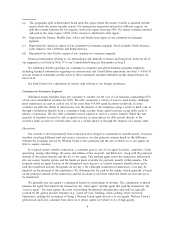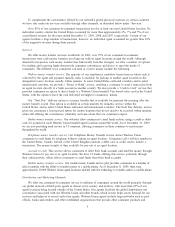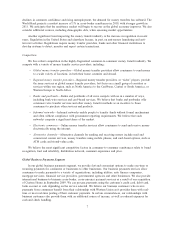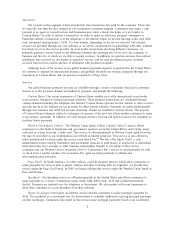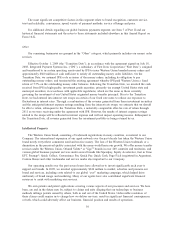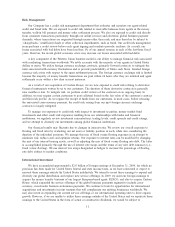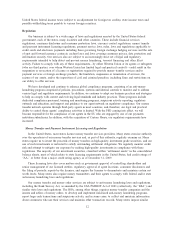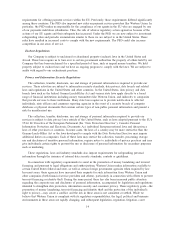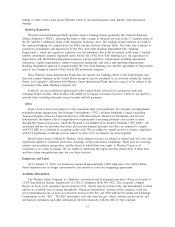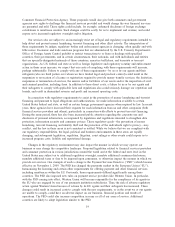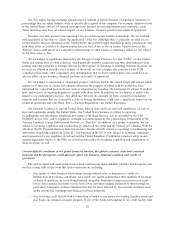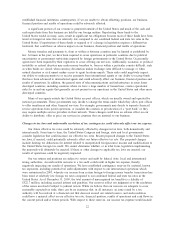Western Union 2009 Annual Report Download - page 27
Download and view the complete annual report
Please find page 27 of the 2009 Western Union annual report below. You can navigate through the pages in the report by either clicking on the pages listed below, or by using the keyword search tool below to find specific information within the annual report.and, in some cases, more stringent requirements. These requirements also apply to our agents. In addition, the
United States Department of the Treasury has interpreted the BSA to require money transfer companies to
conduct due diligence into and risk-based monitoring of their agents inside and outside the United States.
Economic and trade sanctions programs administered by the United States Department of the Treasury
Office of Foreign Assets Control (“OFAC”) prohibit or restrict transactions to or from (or dealings with)
certain countries, their governments, and in certain circumstances, their nationals, as well as with specifically-
designated individuals and entities such as narcotics traffickers, terrorists and terrorist organizations. We
provide very limited consumer-to-consumer services to individuals in Cuba, Syria and Sudan pursuant to and
as authorized by advisory opinions of, or licenses granted by, OFAC.
Outside of the United States, our money transfer business is subject to some form of regulation in all of
the countries and territories in which we offer those services. These laws and regulations may include
limitations on what types of entities may offer money transfer services, limitations on the amount of principal
that can be sent into or out of a country, limitations on the number of money transfers that may be sent or
received by a consumer and agreements on the rates of exchange between currencies. They may also include
laws and regulations intended to help detect and prevent money laundering or terrorist financing. In most
countries, our agents are required to obtain licenses or permits to offer money transfer services.
We have developed and continue to enhance global compliance programs to monitor and to address
various legal and regulatory requirements. Our money transfer network operates through third-party agents in
most countries, and our legal and practical ability to control those agents’ compliance activities is limited. To
assist in managing and monitoring money laundering and terrorist financing risks, we have developed and
continue to enhance our global compliance programs, consisting of an anti-money laundering compliance
program comprised of policies, procedures, systems and internal controls. As of December 31, 2009, we had
over 400 employees in a number of our offices around the world dedicated to our global compliance programs.
We spent over $40 million in 2009 on these efforts. In connection with our agreement and settlement with the
State of Arizona, we will fund a not-for-profit organization to promote safety and security along the entire
United States and Mexico border. This agreement and settlement also resolved all outstanding legal issues and
claims with the State. In addition, as part of the agreement and settlement, we expect to make certain
investments in our compliance programs along the United States and Mexico border and to engage a monitor
of that program, which are expected to cost up to $23 million over the next two to four years. See also
Item 1A, Risk Factors—“Western Union has been the subject of class-action litigation, and remains the subject
of other litigation as well as consent agreements with or enforcement actions by regulators” for more
information on this agreement and settlement.
Government agencies both inside and outside the United States may impose new or additional rules on
money transfers affecting us or our agents, including regulations that:
• prohibit transactions in, to or from certain countries, governments and individuals and entities;
• impose additional identification, reporting or recordkeeping requirements;
• limit the entities capable of providing money transfer services or impose additional licensing or
registration requirements;
• impose minimum capital or other financial requirements on us or our agents;
• limit or restrict the revenue which may be generated from money transfers, including transaction fees
and revenue derived from foreign exchange;
• require additional disclosures to consumers;
• require the principal amount of money transfers originated in a country to be invested in that country
or held in trust until they are paid; or
• limit the number or principal amount of money transfers which may be sent to or from the
jurisdiction, whether by an individual, through one agent or in aggregate.
One example of such a rule is the Payment Services Directive which became effective on November 1,
2009. The PSD has changed the payments market in the EU, harmonizing the licensing and certain other
13



